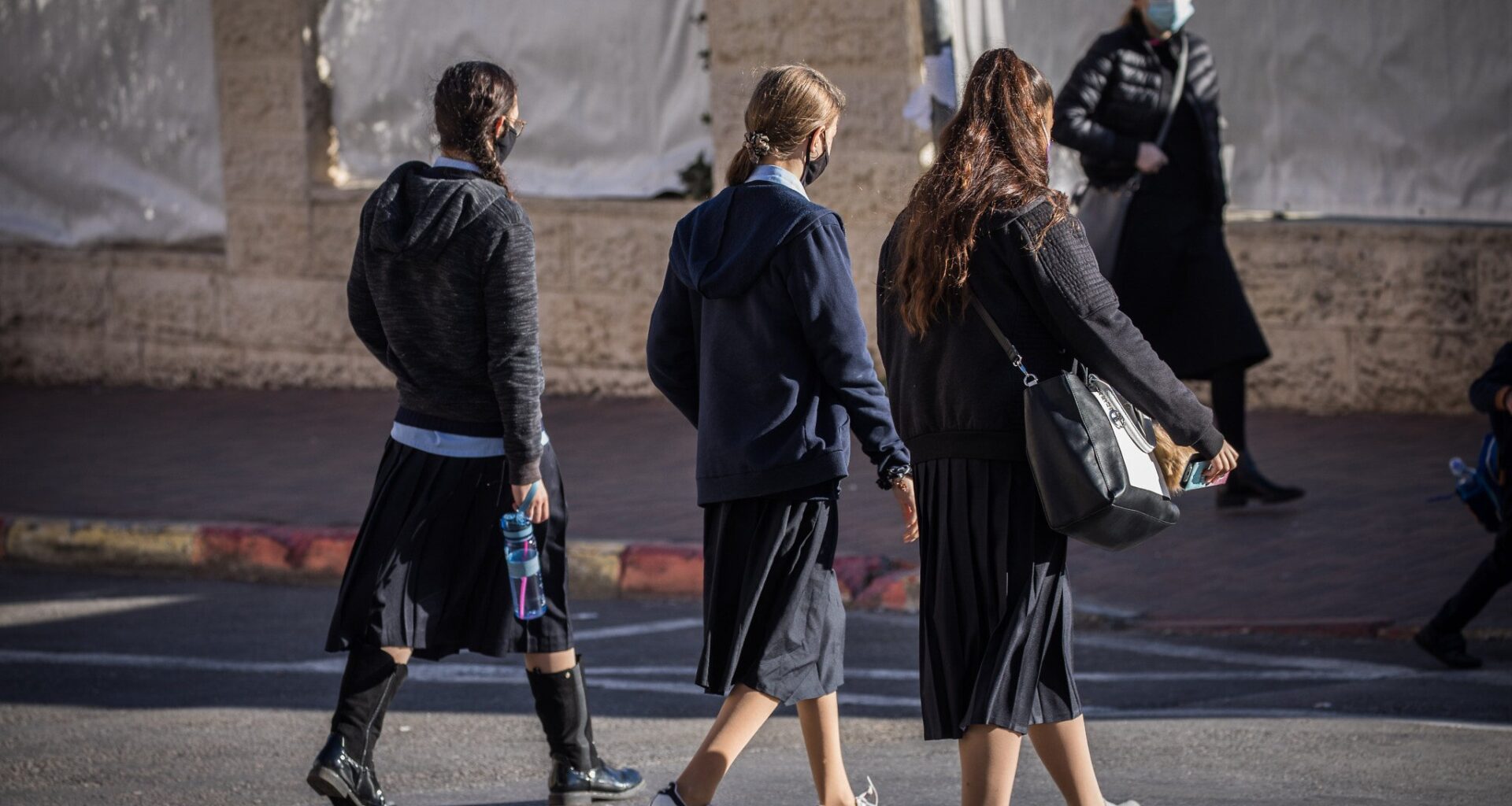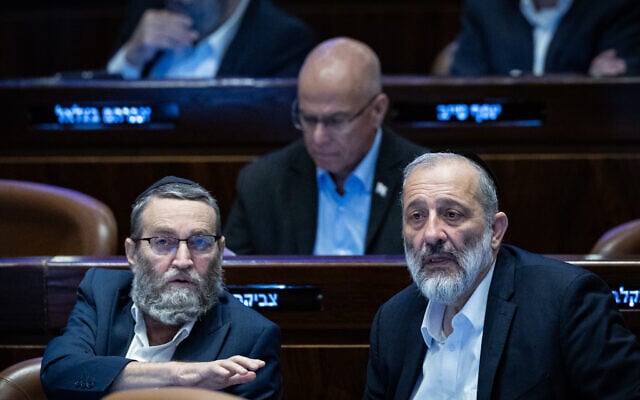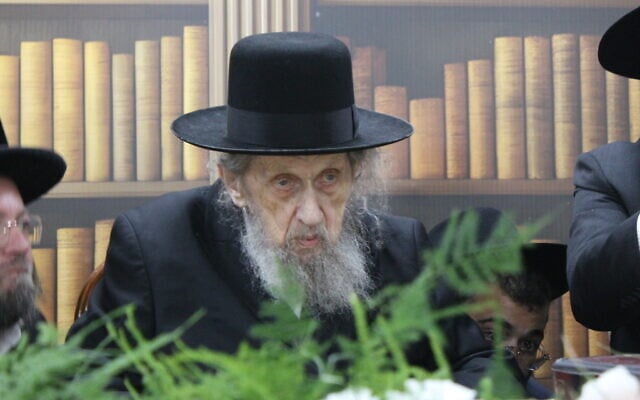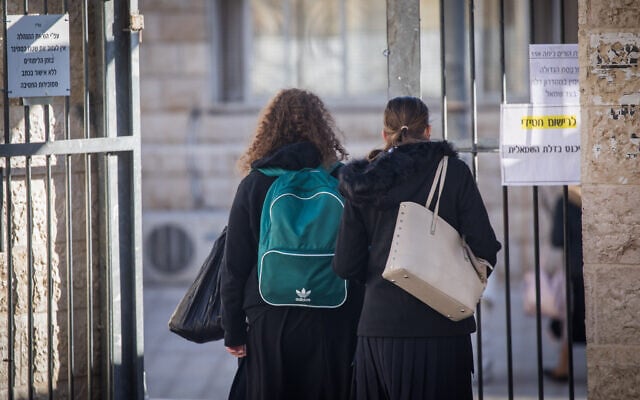Officials at the Education Ministry summoned representatives of multiple ultra-Orthodox schools for hearings on Tuesday after administrators refused to open their doors to students of Sephardic background.
On the instructions of community rabbis, multiple seminaries in Beit Shemesh and Jerusalem declined to allow ninth graders to begin their studies in order to protest instructions by the two cities’ municipalities to accept students of Middle Eastern and North African background who had not been accepted elsewhere.
Discrimination against Sephardic students has plagued the Haredi community for years, and critics charge that many Ashkenazi schools maintain unofficial quotas of Sephardic students stemming from racism against families of Middle Eastern origin.
In an interview with the Ynet news site, the mother of one student of mixed origin described her daughter as “emotionally broken” after a school “asked us to change our last name” to something Ashkenazi.
According to Channel 13 news, Rabbi Dov Lando, one of the most prominent rabbinic leaders of the so-called Lithuanian stream of Ashkenazi ultra-Orthodoxy and the spiritual leader of the United Torah Judaism party’s Degel HaTorah faction, was behind instructions to local rabbis not to accept the girls.
Get The Times of Israel’s Daily Edition
by email and never miss our top stories
By signing up, you agree to the terms
Addressing the issue during an appearance in Beit Shemesh on Monday, Degel HaTorah MK Moshe Gafni called on the Shas party to open additional schools for Sephardic students in the city of Beit Shemesh so that “your girls” don’t need to “crowd into our institutions.”
Shas chairman Aryeh Deri speaks with United Torah Judaism MK Moshe Gafni in the Knesset, December 14, 2023. (Yonatan Sindel/Flash90)
United Torah Judaism represents Haredim of Ashkenazi, or European, origin, while Shas represents those of Middle Eastern and North African descent.
Later in the evening, Rabbi Lando released a letter calling on seminaries in Jerusalem not to open until solutions are found for all students.
Speaking with public broadcaster Kan, Beit Shemesh city councillor Avi Ehrentreu (Degel HaTorah) claimed that the issue was not connected to the girls’ ethnic origins, adding that it was “natural for a person to go to an educational institution that they are politically affiliated with.”
“In recent days, hours upon hours have been invested in finding a solution for the girls, so that every girl can start the year in a suitable and respectable place of study,” he later tweeted.
According to a spokesman for the Beit Shemesh municipality, some fifty girls at five seminaries in the city are affected.
“I can tell you that this isn’t only about Sephardic girls, even though that gets more headlines. There are also Ashkenazi girls who aren’t being accepted. We understand their distress, that they claim they have no place, but in the end, the municipality is obligated to place every student and ensure that all students have a framework,” the spokesman told The Times of Israel.
Rabbi Dov Lando in Bnei Brak, August 21, 2025. (Sam Sokol/The Times of Israel)
“That’s why the municipality acted. To answer your question — the municipality placed all the girls. There isn’t a single girl in Beit Shemesh left without a school. Not one student wasn’t assigned,” he continued, insisting that the schools “must accept the students” and that, if they don’t, the Education Ministry would cut their budgets.
While the larger issue of discrimination dates back years, the latest controversy goes back to this summer, when Channel 13 reported that some 440 Haredi girls in Jerusalem, 73 percent of them Sephardic, had not been accepted into any seminary. As a result, the municipality decided to assign students to seminaries independently and required the schools to accept them.
A separate entrance
In a report in June, the network revealed that Beit Yaakov Darchei Rachel, a prominent Haredi girls’ seminary in Jerusalem, was planning on operating a separate institution for Sephardic students, with a separate entrance from that of their Ashkenazi peers, after it was required by the municipality to accept students of Sephardic origin.
In a statement on Tuesday, the Jerusalem Municipality said that it had “completed all necessary preparations for the orderly opening of the school year, and all of the city’s students, without exception, have been assigned to institutions. A number of schools have decided to postpone the opening of the school year. If an institution has chosen, for its own reasons, not to open the school year, this must be clarified with the Education Ministry, which is the regulator on the matter according to the law.”
Ultra-Orthodox girls make their way to school in Jerusalem, November 24, 2020. (Yonatan Sindel/Flash90)
Asked for comment, the Education Ministry replied that it was “conducting ongoing dialogue with the Jerusalem Municipality, community rabbis and the institutions’ administrations in order to reach agreed solutions, while ensuring compliance with regulations and preventing discrimination.”
“A very small number of cases, in which parents or institutions refused the assigned placement, are being handled strictly — up to and including denial of funding and revocation of the license of the refusing institution,” the ministry stated.
Neither the Jerusalem Municipality nor the Education Ministry provided The Times of Israel with a list of the relevant schools as of press time, nor did they clarify the situation of the Beit Yaakov Darchei Rachel seminary.
State-Haredi schools
On a related matter, Army Radio reported on Tuesday that the scheduled transfer of seven ultra-Orthodox kindergartens in Beit Shemesh to the so-called state-Haredi education stream had been put on ice under Haredi pressure.
However, city councilman Moti Leitner, a representative of the moderate Haredi Derech party and a proponent of state-Haredi schools, said that the development was being misrepresented.
“In essence, they are state kindergartens — they always have been and remain so… It remains a state kindergarten. It’s simply under the Education Ministry’s Jerusalem district instead of the Haredi district,” he said.
You appreciate our journalism

You clearly find our careful reporting valuable, in a time when facts are often distorted and news coverage often lacks context.
Your support is essential to continue our work. We want to continue delivering the professional journalism you value, even as the demands on our newsroom have grown dramatically since October 7.
So today, please consider joining our reader support group, The Times of Israel Community. For as little as $6 a month you’ll become our partners while enjoying The Times of Israel AD-FREE, as well as accessing exclusive content available only to Times of Israel Community members.
Thank you,
David Horovitz, Founding Editor of The Times of Israel
Already a member? Sign in to stop seeing this



